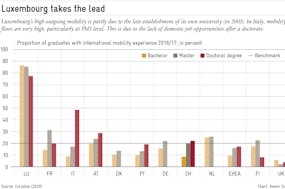Today, we speak about the other important aspect of globalisation: migration. As we all know well, the permanent movement of people over national borders is an even more emotional and more controversial matter than trading goods or services.
Let me start the session with some introductory thoughts.
- The public opinion towards migration is largely negative. A broad survey carried out in many western countries in 2015 showed that 60% of the respondents were critical towards cross-boarder migration and 40% are either neutral or positive. This certainly has a strong impact on what politicians (not only populist politicians) say about migration.
- Interestingly enough, despite the widespread anti-migration rhethoric global cross-boarder migration (both permanent and temporary) has not collapsed after the Great Recession of 2009, but – on the contrary – has continued to rise. In 2015, 4.8 million people migrated permanantly to the OECD countries. This number is 5% higher than the former peak level of 2007 and 10% higher than in 2014. Two out of three migrants into the OECD came from a country outside the OECD.
- There is a sharp contrast between the public opinion or perception of what migration means for the national economies and the scientific evidence of the welfare effects of migration.
- So what’s the economic evidence? Put very briefly, the growth effects of permanent labor market migration (measured as impact on real gdp per capita) is neutral or slightly positive in the short run, but signifacantly positive and directly linked to the number of migrants in the long run (see for example di Giovanni et al.) .
Even more striking: this finding holds for both low skilled and high skilled migration and it also holds for both destination countries and countries of origin. The latter might come as a surprise, since it is clear that countries of origin suffer from brain drain, even more so because migrants tend to form a positive selection from the population. The explanation is high and growing remittances sent back home by the migrants. - If we look at the impact on distribution in the destination countries, the empirical evidence says that there can be (and in many instances will be) effects on the wages and employment of certain groups of workers in the short run. Contrary to popular belief, this does not always and necessarily concern the low skilled segment of the labor markets. In the long run however, the effects of migration on distribution seem to be more or less neutral. So put together with rising gdp per capita in the long run, there is a quite clear conclusion: economically, the whole society benefits from immigration.
- Having said that, what explains the obvious contrast between perception and evidence? Of course, there are cultural concerns, in Switzerland the ugly term „Überfremdung“ was coined in the 70ies by some upsurging (but no longer existing) nationalistic parties. It means something like alienation in the sense of the overwhelming of society by foreigners. But my point is a different one. As with trade, it is quite straightforward to argue that more exports create jobs and more imports is good for consumers.
When it comes to migration, matters are far more complicated and intricate. The scientific results I mentioned come from quite refined economic models, encompassing not only the labor market, but also product markets, firm size, the degree of competition and international trade. Complex modelling is necessary to create an artificial counterfactual world with no migration. The effects of migration on the national economies are then derived as the difference between the model based (counterfactual) state of zero migration and the conditions we observe in the real world. - In the political debate, it is much easier to point to real or alleged losers of migration than to explain to the general public that these workers probably would have been worse off, had there been no migration at all. To make matters worse, the overall positive effects of migration take some time to evolve, whereas politics is increasingly short lived.
- This is the basic communication challenge we all face. The dinner discussion of yesterday showed that there is no easy solution to it. But we should not cease to explain and argue, maybe more emotionally and maybe more focused on individual cases.
- Allow me one last word about Switzerland. After the approval of the initiative against „mass immigration“ with 50,3% voting in favour, there was a growing impression that Switzerland is a quite closed country now tempted to move further into isolation. This impression is completely wrong. Actually, there is – at least in Europe – no country of similar size that is more open to the world than Switzerland. 28% of the Swiss residents are foreign born, and there is an even more impressive fact: almost half of the population (48% to be precise) has a migration background, meaning that at least one parent was born outside the country. These shares exceed the ones in the classic anglo-saxon immigration countries like Canada and Australia by far. So, if we trust the scientific results about the long run effects of migration on the economy (and as an economist myself I tend to do so), the exceptionally high standard of living in Switzerland has a lot to do with immigration. In this respect, Switzerland could even serve as a role model for other countries.





